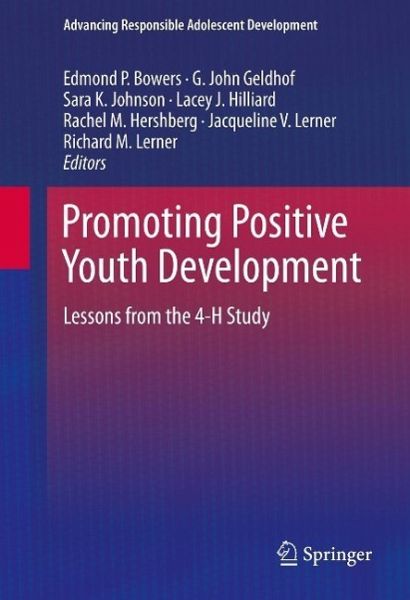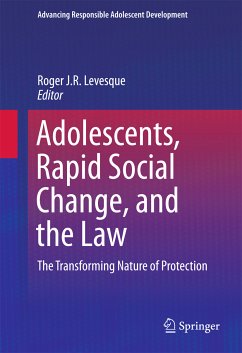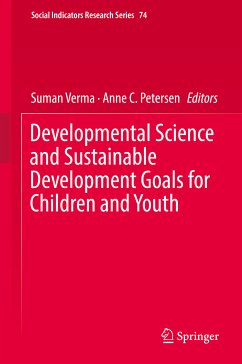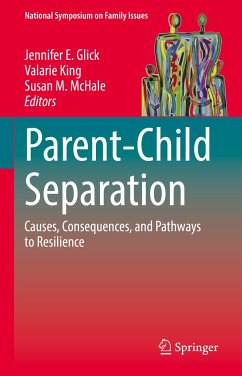
Promoting Positive Youth Development (eBook, PDF)
Lessons from the 4-H Study
Redaktion: Bowers, Edmond P.; Lerner, Richard M.; Lerner, Jacqueline V.; Hershberg, Rachel M.; Hilliard, Lacey J.; Johnson, Sara K.; Geldhof, G. John
Versandkostenfrei!
Sofort per Download lieferbar
72,95 €
inkl. MwSt.
Weitere Ausgaben:

PAYBACK Punkte
36 °P sammeln!
This book presents the results of the longitudinal 4-H Study of Positive Youth Development. The volume discusses how self-regulation and contextual resources (e.g., strong relationships with parents, peers, and the community) can be fostered in young people to contribute to the enhancement of functioning throughout life. Each chapter examines a particular aspect of youth thriving, and offers findings on either the bases or the role of positive development in a variety of outcomes, from reduced risk of emotional problems and harmful behaviors to increased participation in the community. Contrib...
This book presents the results of the longitudinal 4-H Study of Positive Youth Development. The volume discusses how self-regulation and contextual resources (e.g., strong relationships with parents, peers, and the community) can be fostered in young people to contribute to the enhancement of functioning throughout life. Each chapter examines a particular aspect of youth thriving, and offers findings on either the bases or the role of positive development in a variety of outcomes, from reduced risk of emotional problems and harmful behaviors to increased participation in the community. Contributors introduce a contemporary model of positive development for diverse youth, provide examples of effective youth development programs, and suggest applications for informing the next generation of policies and practices. Among the featured topics:
Researchers in developmental psychology as well as practitioners in educational or youth development programs or policies will gain from Promoting Positive Youth Development a new appreciation of the central role of young people's strengths, and initiatives to build effective youth programs.
"This volume is destined to become the handbook for anyone interested in the bourgeoning field of positive youth development. Based on ground breaking, longitudinal research from top researchers in the field, Promoting Healthy Development for America's Youth presents a rich, theoretically grounded understanding of the landscape today's youth and programs. The contributors provide
clear,data-driven guidance regarding the types of programs and settings that are most beneficial to young people."
Jean E. Rhodes, Ph.D.
Frank L. Boyden Professor
Department of Psychology
University of Massachusetts, Boston
- The regulation of emotion in adolescence.
- School engagement, academic achievement, and positive youth development.
- Peer relationships and positive youth development.
- Identity development in adolescence and the implications for youth policy and practice.
- Promoting adolescent sexual health in youth programming.
- A positive youth development approach to bullying.
Researchers in developmental psychology as well as practitioners in educational or youth development programs or policies will gain from Promoting Positive Youth Development a new appreciation of the central role of young people's strengths, and initiatives to build effective youth programs.
"This volume is destined to become the handbook for anyone interested in the bourgeoning field of positive youth development. Based on ground breaking, longitudinal research from top researchers in the field, Promoting Healthy Development for America's Youth presents a rich, theoretically grounded understanding of the landscape today's youth and programs. The contributors provide
clear,data-driven guidance regarding the types of programs and settings that are most beneficial to young people."
Jean E. Rhodes, Ph.D.
Frank L. Boyden Professor
Department of Psychology
University of Massachusetts, Boston
Dieser Download kann aus rechtlichen Gründen nur mit Rechnungsadresse in A, B, BG, CY, CZ, D, DK, EW, E, FIN, F, GR, HR, H, IRL, I, LT, L, LR, M, NL, PL, P, R, S, SLO, SK ausgeliefert werden.













